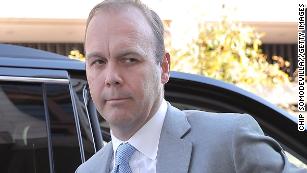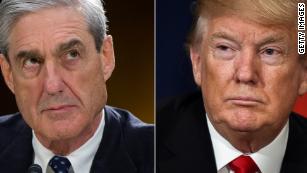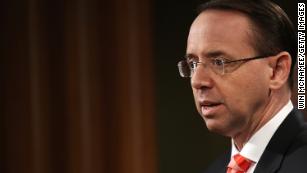President Donald Trump's legal team is preparing answers to written questions provided by special counsel Robert Mueller, according to sources familiar with the matter.
The move represents a major development after months of negotiations and signals that the Mueller investigation could be entering a final phase with regard to the President.
The questions are focused on matters related to the investigation of possible collusion between Trump associates and Russians seeking to meddle in the 2016 election, the sources said. Trump's lawyers are preparing written responses, in part relying on documents previously provided to the special counsel, the sources said.
"We are in continuing discussions with the special counsel and we do not comment on those discussions," said Trump attorney Jay Sekulow.
There may be more rounds of questions after the first answers are returned. The special counsel had insisted that there be a chance for follow-up questions as well. But after a prolonged back-and-forth over months, the two sides agreed to start with a first round of questions.
Additionally, the two sides have still not come to agreement on whether the President will be interviewed in person by investigators who are also probing whether Trump obstructed justice by firing FBI Director James Comey.
Asked on Thursday about answering Mueller's questions, Trump again signaled his willingness to sit down for an interview with Mueller or provide written responses -- the option much preferred by his attorneys.
"It seems ridiculous that I'd have to do it when everybody says there's no collusion, but I'll do what is necessary to get it over with," Trump said in a phone interview on Fox News. Despite Trump's insistence to the contrary, the possibility of collusion remains an open question in the ongoing investigation led by Mueller, who has not tipped his hand one way or the other.
Negotiations for Trump's testimony lasted for the better part of a year. The two sides nearly reached a deal in January for Trump to be questioned at the presidential retreat in rural Maryland, Camp David, only for talks to break down at the last minute. What followed was a series of letters and meetings -- some hostile -- in which Trump's lawyers raised objections and sought to limit any potential testimony.
For months, Mueller told Trump's lawyers that he needed to hear from the President to determine his intent on key events in the obstruction inquiry. During one tense session in March, Mueller raised the possibility of getting a subpoena to compel the President's testimony.
Trump's lead attorney John Dowd resigned later that month. According to a recent book published by journalist Bob Woodward, Dowd quit because he believed Trump would never heed his advice to avoid an interview at all costs. Trump once publicly said he was "100%" willing to go under oath to answer questions about his decision to fire Comey, who led the original Russia investigation before Mueller was appointed.
The President eventually hired Rudy Giuliani to join his legal team, and the former New York mayor quickly took to the airwaves to defend Trump and attack Mueller. As Giuliani made the rounds on TV newscasts -- blasting the investigation as illegitimate -- Trump's other lawyers, Jane and Marty Raskin, carefully worked behind the sceneswith Mueller's team to narrow the topics that Trump could be asked about.


